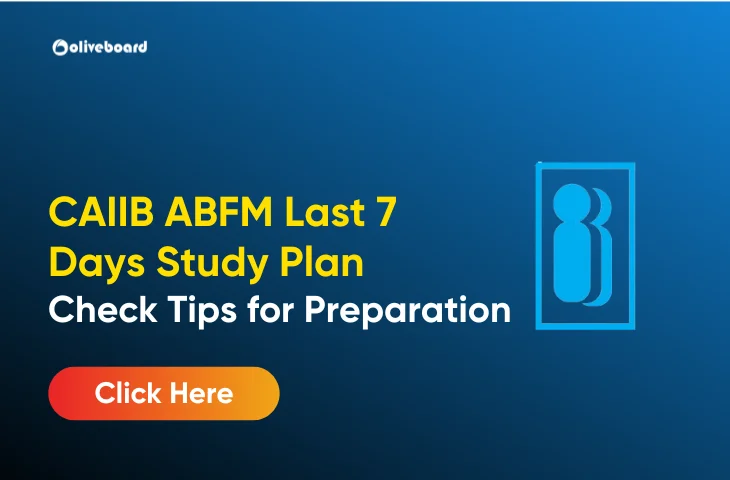CAIIB ABFM Last 7 Days Study Plan
Preparing for the CAIIB Advanced Business and Financial Management (ABFM) exam requires a focused and smart strategy, especially in the final week. The last seven days are important for revising important topics, practicing questions, and boosting your confidence for the exam. This article provides a CAIIB ABFM Last 7 Days Study Plan to help you prepare efficiently and stay on track during the final stretch.
Why Follow a 7 Day Study Plan for CAIIB ABFM?
The last week is the perfect time to focus on:
- Revising high-priority topics.
- Practicing numerical and case-based questions.
- Reviewing past mistakes from CAIIB mock tests.
- Strengthening weak areas.
A well structured study plan ensures you don’t waste time and helps you stay organized and confident.
CAIIB ABFM Last 7 Days Study Plan
Here is a 7-day study plan that will help you organize your preparation and increase your chances of success in the CAIIB ABFM exam.
Day 1-2: Focus on Key Topics in Module A & B
Module A: Business Management (Theory-heavy)
Spend the first two days focusing on the most important topics in Module A, including:
- Functions of Management
- Management Thoughts & Approaches
- Business Environment Analysis
- Leadership, Motivation, Communication, Supervision
Tips for Day 1-2:
- Focus on theory-based concepts and understand the core principles of business management.
- Revise important definitions, models, and theories.
- Create short notes on key management approaches and conflict management strategies.
Module B: Financial Management (Concepts + Numericals)
Module B covers financial strategies, capital budgeting, and decision-making. These concepts are critical for CAIIB ABFM preparation.
Topics to Cover:
- Financial and Operating Leverages
- Capital Investment Decisions
- Cost-Volume-Profit (CVP) Analysis
- Ethical Considerations in Decision Making
Tips for Day 1-2:
- Understand formulas and their applications in financial management.
- Practice solving numerical problems related to financial leverage and capital budgeting.
- Watch video lectures if available to clarify complex topics.
Day 3-4: Deep Dive into Module C & D
Module C: Valuations, Mergers, and Acquisitions
Module C is numerical-heavy, so you’ll need to understand various valuation techniques.
Key Topics:
- Discounted Cash Flow (DCF) Models
- Valuation of Companies and Equity
- Mergers & Acquisitions concepts
Tips for Day 3-4:
- Review numerical case studies related to mergers and valuations.
- Focus on understanding the valuation models and practice related problems.
- Work on case studies that involve corporate restructuring and acquisition strategies.
Module D: Emerging Business Solutions
In Module D, the focus is on newer business solutions like artificial intelligence and private equity. These topics may seem challenging, but breaking them down into simpler concepts will help.
Key Topics:
- Artificial Intelligence in Finance
- Private Equity and Venture Capital
- Green and Sustainable Finance
Tips for Day 3-4:
- Revise the advantages and disadvantages of private equity and venture capital investments.
- Focus on understanding emerging trends in business solutions like AI and sustainable finance.
Day 5: Practice Mock Tests & Previous Year Questions
The best way to check your preparation level is to practice with mock tests and solve previous year questions (PYQs).
Mock Test Strategy:
- Spend this day attempting a full-length mock test.
- Analyze your mistakes and focus on weak areas.
- Prioritize topics that appear frequently in the exams.
Tips for Day 5:
- Take at least two mock tests to simulate the real exam environment.
- Review solutions and explanations for mistakes.
- Focus on time management during mock tests to improve speed.
Day 6: Focus on Weak Areas & Case Studies
On Day 6, revisit the topics that need more attention. Whether it’s a specific concept from financial management or a tricky numerical problem, it’s important to address your weaknesses.
Key Focus Areas:
- Risk Management
- Treasury Management
- Case studies in financial management and decision-making.
Tips for Day 6:
- Revisit the formulae for financial calculations.
- Practice solving numerical case studies from all modules.
- Revise case studies on mergers, acquisitions, and corporate restructuring.
Day 7: Final Revision & Strategy
On the final day, your goal should be revision and relaxation. Focus on important concepts but avoid cramming. A calm mind will help you retain the information better.
Final Revision:
- Focus on Module A for theory and definitions.
- Go over short notes and formulas for financial management and valuation models.
- Focus on exam strategies like eliminating wrong options quickly in MCQs.
Tips for Day 7:
- Do not stress on Day 7. Focus on revision and rest.
- Go through your short notes, especially for theoretical concepts.
- Take time to relax and sleep well before the exam.
Tips for Effective CAIIB ABFM Preparation
Here are a few additional tips to make the most of the last 7 days of study:
1. Prioritize High-Weightage Topics:
- Identify and prioritize topics that have a higher weightage in the exam. Focus on Module A for theory and Module B for numericals.
2. Time Management:
- Break your study time into 2-hour blocks with short breaks in between. This helps improve concentration and retention.
3. Stay Consistent:
- Even in the final days, stay consistent with your study routine. Don’t try to cover too many new topics on the last day.
4. Solve Previous Year’s Papers:
- Solving previous years’ papers helps familiarize you with the exam format and question types.
5. Use the Right Resources:
- Stick to recommended resources like IIBF CAIIB materials, online courses, and mock tests.
CAIIB ABFM Syllabus
The CAIIB ABFM Syllabus 2024 is created to provide banking professionals with an in-depth understanding of advanced business and financial management practices. Below is an overview of the modules included in the ABFM syllabus:
| Module | Topics Covered |
| Module 1: Business Management | – Basic Principles of Business Management |
| – Understanding Business Environment and Strategic Management | |
| – Importance of Corporate Social Responsibility (CSR) | |
| Module 2: Financial Management | – Financial Planning and Forecasting Techniques |
| – Capital Structure and Cost of Capital Analysis | |
| – How to Analyze Financial Statements | |
| Module 3: Management Accounting | – Cost Concepts and Various Costing Techniques |
| – Budgeting and Variance Analysis Methods | |
| – Performance Measurement Tools | |
| Module 4: Risk Management | – Identifying and Assessing Risks |
| – Types of Risks in Banking Operations | |
| – Strategies for Risk Mitigation | |
| Module 5: Treasury Management | – Key Functions of Treasury Management |
| – Importance of Liquidity Management | |
| – Managing Foreign Exchange and Interest Rate Risks | |
| Module 6: Financial Markets | – Overview of Different Financial Markets |
| – Instruments and Participants in Financial Markets | |
| – Regulations and Compliance in the Market | |
| Module 7: Investment Management | – Techniques for Investment Analysis |
| – Strategies for Portfolio Management | |
| – Understanding Mutual Funds and Derivatives |
CAIIB ABFM Exam Pattern
The CAIIB ABFM Exam Pattern consists of 100 multiple choice questions (MCQs) to be completed in 2 hours, with each correct answer awarded 1 mark.
| Aspect | Details |
| Mode of Exam | Online (Computer-Based Test) |
| Type of Questions | Multiple Choice Questions (MCQs) |
| Number of Questions | 100 |
| Duration | 2 hours (120 minutes) |
| Maximum Marks | 100 |
| Marking Scheme | 1 mark for each correct answer |
| Negative Marking | No Negative Marking |
| Qualifying Marks | Minimum 50 marks (varies based on the overall performance and cut-offs set by IIBF) |
Most Important ABFM MCQs with answers
Most Important ABFM MCQs with answers are important for mastering key concepts in Advanced Bank Financial Management, enabling focused preparation and better retention.
1. What is the primary objective of liquidity management in a bank?
A. Maximizing profitability
B. Maintaining enough cash to meet obligations
C. Minimizing operational risks
D. Enhancing capital adequacy
Answer: B. Maintaining enough cash to meet obligations
2. Which of the following tools is used by central banks for monetary policy implementation?
A. Credit rating
B. Open Market Operations (OMO)
C. Venture capital financing
D. Risk modeling
Answer: B. Open Market Operations (OMO)
3. What is the main purpose of Basel III guidelines?
A. To control inflation
B. To enhance risk management and banking regulation
C. To promote investment in infrastructure
D. To provide loans to small businesses
Answer: B. To enhance risk management and banking regulation
4. In financial risk management, what does VaR (Value at Risk) measure?
A. The expected rate of return on an investment
B. The worst expected loss under normal market conditions over a specific time period
C. The potential profit from a trade
D. The maximum capital required for investment
Answer: B. The worst expected loss under normal market conditions over a specific time period
5. What does the term ‘asset-liability mismatch’ refer to?
A. Excessive lending to risky sectors
B. A situation where assets and liabilities are not properly aligned in terms of maturity or interest rates
C. Inadequate provisioning for bad debts
D. Inaccurate financial reporting
Answer: B. A situation where assets and liabilities are not properly aligned in terms of maturity or interest rates
6. Which risk arises from adverse movements in interest rates impacting a bank’s earnings or economic value?
A. Market risk
B. Credit risk
C. Operational risk
D. Interest rate risk
Answer: D. Interest rate risk
7. What is the purpose of a Credit Default Swap (CDS)?
A. To insure against default on a loan or bond
B. To hedge against currency risk
C. To manage liquidity shortages
D. To speculate on equity price changes
Answer: A. To insure against default on a loan or bond
8. What is the significance of the Capital Adequacy Ratio (CAR) for banks?
A. It measures the profitability of a bank
B. It ensures that banks have sufficient capital to absorb losses and meet obligations
C. It calculates the efficiency of a bank’s operations
D. It monitors the liquidity of assets
Answer: B. It ensures that banks have sufficient capital to absorb losses and meet obligations
9. In the context of foreign exchange risk management, what is a “forward contract”?
A. A loan given to foreign clients
B. An agreement to exchange currency at a fixed rate on a future date
C. An investment in foreign bonds
D. A type of swap transaction
Answer: B. An agreement to exchange currency at a fixed rate on a future date
10. Which of the following is a key component of operational risk?
A. Fluctuations in exchange rates
B. Failures in internal processes, people, and systems
C. Changes in regulatory frameworks
D. Decline in market share
Answer: B. Failures in internal processes, people, and systems
Overview of the 7 – Day Study Plan
Here is a quick summary of the CAIIB ABFM Last 7 Days Study Plan:
| Day | Focus Areas | Activities |
| Day 1 | Theoretical Concepts | Revise key topics from Unit 1 & Unit 2. |
| Day 2 | Financial Strategies & Risk | Cover Unit 3 and solve case studies. |
| Day 3 | Leadership & Business Frameworks | Revise models like SWOT, Porter’s Five Forces, and motivation theories. |
| Day 4 | Numerical Topics | Practice calculations like NPV, IRR, and ROI. |
| Day 5 | CAIIB Mock Test | Attempt a full mock test and analyze performance. |
| Day 6 | Focus on Weak Areas | Revise weak topics and practice MCQs. |
| Day 7 | Final Revision | Review notes, formulas, and important concepts. |
CAIIB ABFM Highest Weightage Topics
Preparing for CAIIB ABFM? Focus on important topics like Financial Management, Risk Management, and Business Strategy to score better. These topics carry high weightage in the exam. For detailed information and preparation tips, click the link below.
CAIIB ABFM Highest Weightage Topics – click here to Check
CAIIB ABFM Priority Syllabus For CAIIB Dec 2024
The CAIIB ABFM Priority Syllabus for CAIIB December 2024 focuses on high-priority topics such as Financial Markets and Services, covering Capital Markets, Money Markets, and Derivatives, along with Risk Management in Banks, including Credit, Market, and Operational Risks. Medium-priority topics include Banking Regulations like RBI Guidelines and Banking Codes, and Banking Operations with a focus on Digital Banking and Cyber Security. Strategic Management in Banking and International Banking are considered low-priority areas, covering Corporate Governance and Forex.
Conclusion
Preparing for the CAIIB ABFM exam in the last week requires focus, consistency, and smart planning. By following this CAIIB ABFM Last 7 Days Study Plan, you can cover essential topics, practice effectively, and build confidence.
CAIIB ABFM Last 7 Days Study Plan – FAQs
Ans. High-weightage topics include business environment, financial strategies, and numerical problems like capital budgeting.
Ans. It is recommended to take at least 2-3 full-length mock tests in the final week.
Ans. Focus on notes, key formulas, and solving past papers or mock tests to strengthen your preparation.
- CAIIB Electives Exam Analysis 2025, June All Shifts Review
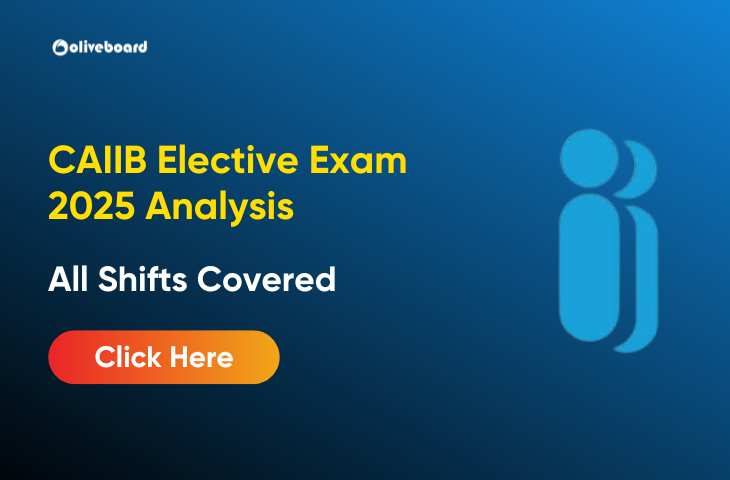
- CAIIB BRBL Exam Analysis 2025, June All Shifts Review
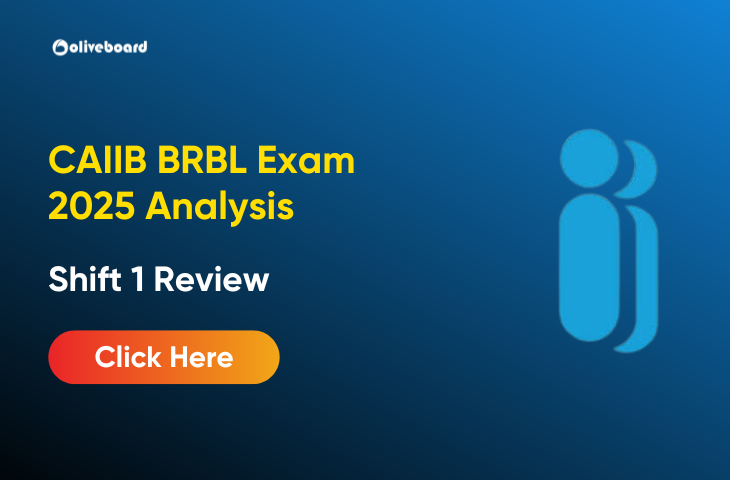
- CAIIB ABFM Exam 2025 Analysis, Shift 1 & 2 – 22nd June 2025

- CAIIB BFM Exam Analysis 2025, All Shift Analysis Released

- CAIIB ABM Exam Analysis 2025, All Shifts, May-June Cycle
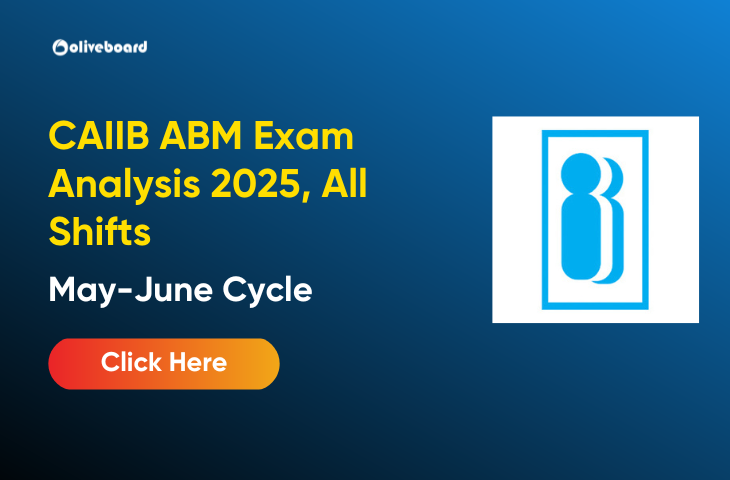
- CAIIB Admit Card 2025, Check Steps to Download Call Letter
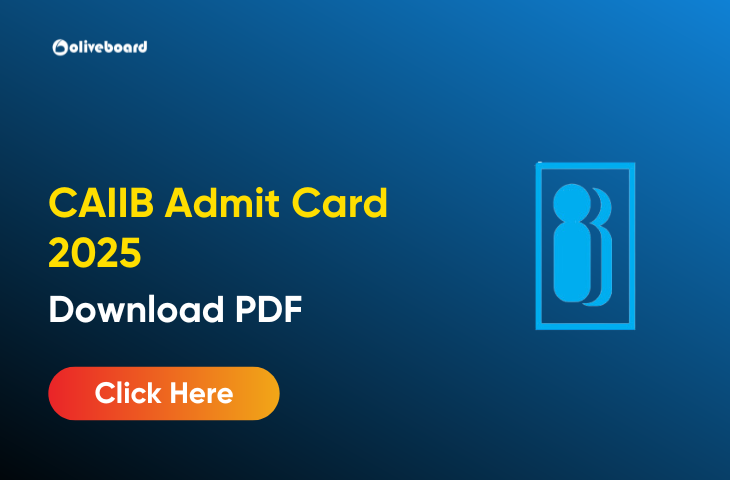

Hello there! I’m a dedicated Government Job aspirant turned passionate writer & content marketer. My blogs are a one-stop destination for accurate and comprehensive information on exams like Regulatory Bodies, Banking, SSC, State PSCs, and more. I’m on a mission to provide you with all the details you need, conveniently in one place. When I’m not writing and marketing, you’ll find me happily experimenting in the kitchen, cooking up delightful treats. Join me on this journey of knowledge and flavors!
